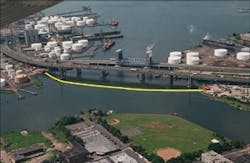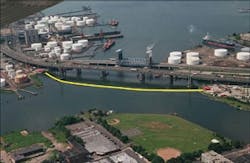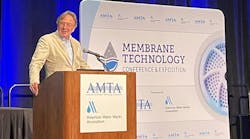ORLANDO, FL, Oct. 12, 2009 -- Costs associated with treatment and disposal of biosolids can be half of a communities' operations budget. As cash-strapped cities are looking for ways to reduce costs, water technology providers such as Siemens are providing answers to reduce the cost of biosolids management, while providing a sometimes unexpected boost to the bottom line. Moreover, communities are finding that in addition to reduced operations costs, they have less waste and use less energy -- a big benefit for the environment.
In the US, municipal wastewater treatment plants traditionally have had one focus: treat wastewater and return clean water back to the environment, meeting all regulatory requirements. But, as cities and populations grow, there is an increasing need to focus on the residual byproduct of the wastewater process, biosolids. Escalating waste disposal and energy costs for biosolids treatment, along with the environmental impact for landfills have increased the focus on biosolids management and waste minimization. In fact, the largest costs associated with wastewater treatment are related to the energy and disposal fees for biosolids management. It is estimated that disposal fees will increase more than 10 times in the next 10 years.
"With increasing pressures to municipal governments' budgets, it's imperative to address the energy and waste disposal costs as part of the engineering equation. We're seeing a more holistic approach to the wastewater treatment process. Municipalities and engineers are evaluating the entire wastewater operations, including solids disposal and beneficial reuse of biogas and total energy consumption," said Chuck Gordon, CEO of Siemens Water Technologies.
According to EPA estimates, the quantity of sludge produced in a waste water treatment plant is approximately 1% of the quantity of treated wastewater yet sludge management costs can be as high as 40-50% of total operating costs, much of this for disposal. Technology solution providers, such as Siemens, are looking at this issue from many different angles. For instance, technologies that reduce biosolids, more efficiently dewater and dry sludge, better capture and convert biogas or compost are providing opportunities for communities to beneficially use biosolids and reduce operating costs, while benefitting the environment.
One recent technology advancement is the Cannibal Solids Reduction System, which can reduce the production of biosolids by 50-80%. This system re-configures the traditional activated sludge process, lowering the biosolids production, while significantly reducing the power requirements for biosolids stabilization. On West Coast community, saved about $50,000 in sludge disposal costs per year, and yet another saved about $80,000 per year.
Siemens has also seen significant interest in its BioFlowsheet+ Solutions Program, a biological process optimization program, which evaluates specific cost factor such as energy use, labor and disposal. The program integrates several key wastewater operations including biological, solids separation and controls. A recent California wastewater treatment plant was able to achieve a 70% reduction in biosolids production while reducing the aeration requirements from their aerobic digester by more than 90% by incorporating the Cannibal interchange bioreactor.
Dewatering and drying systems can help municipalities reduce disposal costs while simultaneously reducing their energy needs. Siemens systems such as the Centramax dewatering centrifuge, the J-Vap vacuum/drying filter press and the CTD biosolids dryer are three such systems.
A Corona, Calif. wastewater treatment plant installed a Siemens CTD biosolids dryer. Using a dual fuel source, natural gas and digester gas, the energy efficient biosolids dryer works in conjunction with the cogeneration facility, producing a fuel for the facility while reducing the volume of biosolids by 80%. In addition, the process produces a Class A beneficial reuse product that can be applied to land for agricultural purposes as well as using it for an organic fuel, and supplies the low-grade heat necessary to promote biological growth in the plant's digesters.
Finally, ESCO (energy services company) performance contracts are an alternative funding method for a capital improvement in the wastewater plant that reduces energy use, operation costs, and labor. Samples of energy services and improvement measures include biosolids reduction, methane gas creation and usage, water conservation and reuse, high-efficiency dryer installation, SCADA system improvements, and aeration system upgrades.
"With greater awareness comes a faster push for innovation, which will provide even more options for communities to reduce life cycle costs and improve their biosolids management. This is win-win for the community and the environment," said Gordon.
About Siemens Industry Sector
The Siemens Industry Sector (Erlangen, Germany) is the world's leading supplier of production, transportation, building and lighting technologies. With integrated automation technologies as well as comprehensive industry-specific solutions, Siemens increases the productivity, efficiency and flexibility of its customers in the fields of industry and infrastructure. The Sector consists of six Divisions: Building Technologies, Drive Technologies, Industry Automation, Industry Solutions, Mobility and Osram. With around 222,000 employees worldwide Siemens Industry posted in fiscal year 2008 a profit of EUR3.86 billion with revenues totaling EUR38 billion. www.siemens.com/industry
About Siemens Industry Solutions Division
With the business activities of Siemens VAI Metals Technologies, (Linz, Austria), Siemens Water Technologies (Warrendale, Pa., U.S.A.), and Industrial Technologies, (Erlangen, Germany), the Siemens Industry Solutions Division (Erlangen, Germany) is one of the world's leading solution and service providers for industrial and infrastructure facilities. Using its own products, systems and process technologies, Industry Solutions develops and builds plants for end customers, commissions them and provides support during their entire life cycle. With around 31,000 employees worldwide Siemens Industry Solutions achieved an order intake of EUR 8.415 billon in fiscal year 2008.
###




